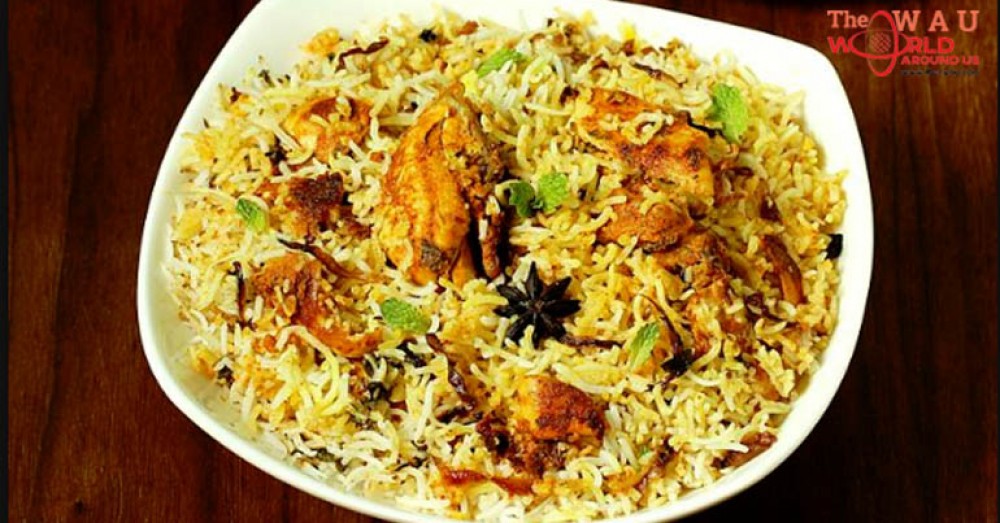Ghulam Abbas' last wish before the medical procedure, that would totally remove his stomach, was to gorge on a plate of chicken biryani.
Life was going ahead as normal until one day, the engineer needed to make a choice - choose a life without a stomach or die from stomach cancer.
After a long treatment to kill his cancer, he was prompted that removing his stomach would be the best alternative. Notwithstanding, he had one wish before the medical procedure. "I asked the doctor if I could have chicken biryani as my last meal before the surgery. My wife prepared it and my brother carried it to the hospital. I sort of gorged on it," he said.
Ghulam Abbas has twochildren, a one-and-a-half year old child and a six-year-old little girl. He was diagnosed to have arrange three cancer after he walked into Rashid Hospital's Gastroenterology center complaining of sudden weight loss and vomiting. Tests revealed that he had a huge tumour that covered almost his entire stomach.
Ghulam Abbas said "It's the most wrecking choice but then the appropriate response was clear, I needed to do whatever it hope to spare my life,"
"I didn't need my youngsters to grow up without my essence; I would not like to lose the chance to see their points of reference, watch them giggle, even battle. I was not going to abandon my family and me. I simply needed to clutch life," he added.
"I had just a single inquiry. How might I have the capacity to make due without a stomach?"
Gastric cancer is the second driving reason for cancer related death and the fourth most basic disease around the world.
Head of general surgery and consultant laparoscopic surgeon at Rashid Hospital, Dr Ali Khammas said: "In young patients unfortunately we see the cancer is very aggressive."
"There was no choice however to lead an aggregate gastrectomy. We chose to play out the medical procedure negligibly intrusively, which has numerous favorable circumstances instead of open medical procedure. We have played out a few colon malignancy medical procedures utilizing this strategy however for an aggregate gastrectomy, it was the first-of-its-kind medical procedure in Dubai," included the specialist.
But before the surgery, doctors wanted to evaluate Abbas' response to chemotherapy.
Dr Omar Al Marzouqi, consultant laparoscopic surgeon, said: "Sometimes in aggressive cancers of this kind, the tumour increases in size and spreads rapidly even while the patient is on chemotherapy. We do not expose such patients to surgery. After two months of chemotherapy at Dubai Hospital, his tumour shrunk in size, so we decided to go ahead with the surgery," he said.
"After the chemotherapy I felt better. I was on nasal feed for two months and post the chemotherapy I actually ate four proper meals over the next few days. So I hoped that chemotherapy would be enough to tackle the tumour," said Abbas.
However doctors told Abbas that chemotherapy only shrinks the tumour but leaving a cancerous tumour inside the stomach is a ticking time bomb.
"I was relieved to know that it will be a minimally invasive surgery. It meant that I could have a quicker chance to recovery."
The next day Abbas went into a five-hour surgery. Dr Al Marzouqi, who performed the surgery with his team, said: "Traditionally such as surgery would involve opening up the abdomen vertically from the stomach to the pelvis but minimally invasive surgery is the way forward in many cases as it is less invasive and leads to much faster recovery time."
"For colon cancer cases we have used this method several times but this type of surgery was the first in Dubai. We laparoscopically removed the total stomach and the lymphatic drainage system from the root. We then reconstructed the whole area in such a way that the small bowel (small intestine) functions as the stomach."
The surgery was a success; the pathology report showed that the surrounding area was also free of cancer-cells.
Abbas is still undergoing chemotherapy at Dubai Hospital as a preventive measure.
Dr Al Marzouqi said: "It is normal to question how a person can live without a stomach. However, the body is able to bypass the stomach's main function of storing and breaking down food to gradually pass to the intestines. Without a stomach, food consumed in small quantities can move directly from the oesophagus to the small intestine."
Abbas needs to be very mindful of the quantities he consumes. He has to nourish his body in tiny meals throughout the day.
"Here the credit goes to my wife. She meticulously prepares small meals for me and I keep track of how often I need to eat. Post the surgery I was on watery liquids and then I moved on to thick liquids. I will soon start consuming small non-spicy meals.
"I've adapted to this new pattern. Things could have been worse. I'm here, alive, what more could I possibly ask for?"
Share This Post















